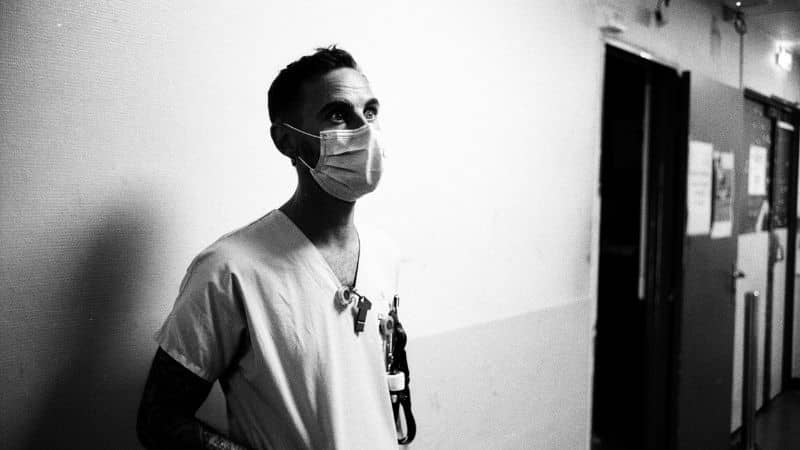Burned-out medicines, burned-out nurses, helpless and, as a consequence, a series of departures from service during the Covid-19 period was only the most evident moment to have a look into the fragile structures of – not only – French hospitals today, degraded for many years by political decisions. Hospital services are reduced to a kind of reparations factory to allow the stranded to fit again into their former lives without a more profound reflection and assistance to ask where they are coming from and where they are going.
Inside a hospital, the psychiatric and psychological service is the one most confronted by these questions about what is normal and what is crazy (meaning: non-adapted). Couldn’t a set of behaviours and actions be recognised as normal reactions facing a crazy neoliberal society, one which has lost its sense of humanity, communication, respect and conviviality?

Nicolas Peduzzi
One complexity to the next
In Cannes’ ACID section presented the documentary On the Edge (État limite), we find Jamal Abdel Kader (just called Jamal) active in the Beaujon Hospital at Clichy near Paris, confronted with such problems. Jamal is gifted with a true sense of dialogue and will of understanding, and at the same time, aware of all the destructive «normal» forces of actual societies’ proceedings, and even more conscious in the daily stressed time of his own limitations to help and to assist.
Nicolas Peduzzi, director of On the Edge, follows with sensitivity and flexibility Jamal’s jumps from one complex situation to the next, trying to restore dignity to each of the quite different patients in his way of listening and asking questions, but also simultaneously handling problems like police presence in the hospital’s corridors during hours, further often resisting to purely medical treatments like the attribution of sedatives, as finally also being responsible for his still overwhelmed new assistant, with whom he does not hesitate to share his reflections and sometimes doubts.
The director of photography, Penelope Chauvelot, finds her way remarkably in pointing out the anonymity of corridors while at the same time carefully participating in Jamal’s dialogues with patients, sometimes through a half-open door, so the patient rests invisible, then adding split screens or overlapping scenes to represent the simultaneity of events, suddenly interrupting the flow with black and white photography, allowing moments of reflections and distancing.
Couldn’t a set of behaviours and actions be recognised as normal reactions facing a crazy neoliberal society, one which has lost its sense of humanity, communication, respect and conviviality?
Redefine the difficult
Peduzzi’s use of voices off-screen allows him to redefine the difficult split between being permanently engaged, angled in action and, at the same time, taking a reflective distance. Jamal’s intention clearly is to resist the application of pathologies on victims, consequently also accusing the pathology of a collapsing society and community. The composer Gael Rakotondrabe’s electronically rhythmical sound underlines this appropriately, adapting to the ongoing speedy succession of conflicts and confrontations.
It’s not by chance that public hospitals, retirement homes and psychological assistance institutions become the centre of interest by their acceleration and intensity to accentuate societies’ actual conflicts. Ken Loach, Nicolas Philibert, Didier Eribon, and Claire Simon’s Our Body are only recent examples.
A long time ago, the question of whether working in a hospital could or should be a lifetime job would have been necessarily discussed. However, alternatives never ever seemed to have been developed. A model of organised and assisted changes between first-line confrontations and more relaxed working situations seems more urgent than ever. The same topic could also be reflected concerning the situation of schoolteachers.
The doubts of Jamal can go so far as to ask himself if his work is not contributing to perpetuating a destructive system to which he became complicit. Treating symptoms is the best way not to treat the reasons for sickness. Also, his assistant, already confronted with sleep problems, asks himself if he is not losing the sense of his work in dehumanising mechanisms.

Nicolas Peduzzi
Deeper reflection
But indeed, Jamal’s deep and reflected humanity facing people in heavy need is not allowing him to step out. And fortunately still, there are moments allowing a deeper reflection and introversion. Suicide patients play Shakespeare’s Romeo and Juliet death scenes, a possibility for the actors to open up, share and speak out their own fears and troubles.
These flight lines (a la Gilles Deleuze) moments are the rising intensities against the fabrication of madness. Jamal repeatedly finds hints in his dialogues with the patients that mediation itself, besides short-time healthy results, is one of the most efficient factors in creating profiles of madness, which are only working self-referential to establish pathologies.
Jamal is conscientious that the younger victims, especially, are losing motivation to carry on in a world marked by permanent rejections in the present and without promises for the future, and are then starting to harm themselves to death, partly, maybe, just as a way to get attention for a moment.
Let’s summarise with Nicolas Phillibert’s statement during an interview: «The health (service) is in a bad state; it needs to be cured. In the centre of the public health system, psychiatry seemed abandoned: it is not profitable to heal people considered as incurable.»
It needs people like Jamal, 34 years old and the son of Syrian immigrants, to spread out some grains of hope in spite of everything.



